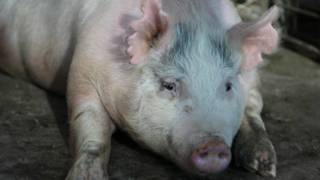
Would you let you transplanted pancreas if your donor is a pig?
What if, despite come from a pig, the body was human, or almost
This is what we are trying to produce scientists at the University of California Davis in the United States:. human bodies through the modification of porcine embryos
through human stem cells implanted into pig embryos, have managed to produce pig-human embryos that have been called “chimeras”.
The program ” Panorama “the BBC had access to the experiment.
the aim of the research is to overcome the global shortage of organs for transplantation.
So far embryos chimera have been developed until the 28th week of gestation , when the pregnancy has been terminated and removed tissue for analysis.
But the team in charge of the investigation said that birth, animals should look and behave like normal pigs, but would a body composed of human cells .
creating a chimera
creation of chimeric embryos it occurs in two stages.
first, a technique known as editing CRISPR gene removes DNA from a pig embryo newly fertilized for the fetus grown pancreas used.
This creates a “niche” (or empty) genetic.
Then induced pluripotent stem cells human (IPS, according to its acronym in English) are injected into the embryo.
——————-
Chimeras the twenty-first century?
In Greek mythology, chimeras are fire-breathing monsters, part lion, part goat and part serpent.
“Perhaps the term chimera will have a new meaning ., a much more affectionate The chimeras will be seen for what they are: a savior, “said Scott Fahrenkrug, whose company -Recombinetics, Minnesota-based has been associated with a chimera research
-. ————–
the UC Davis team hopes that human stem cells exploit the genetic niche in the pig embryo that will grow a human pancreas in the resulting fetus.
“Our hope is that this pig embryo develops normally, but the pancreas is formed almost entirely of human cells, so it can be compatible with a patient for transplantation,” says Paul Ross, reproductive biologist and researcher in charge.
more human Pigs?
But the work is controversial. Last year, the main medical research agency of the US., the National Institutes of Health suspended funding of such experiments.
main concern is that human cells can migrate to the brain developing pig and make this become, somehow, more human.
Ross says this is unlikely, but it is one of the keys for which research has been done so cautiously.
“We there is a very low potential for a human brain to develop, but it is something we are investigating, “he said.
biological incubator
Your team already he has injected human stem cells into pig embryos, but still create the genetic niche. What has been found so far is that human cells “struggled to compete” with pork.
Walter Low, a professor in the Department of Neurosurgery at the University of Minnesota, he said pigs were a “biological incubator” ideal for growing human organs, and could be used to grow not only the pancreas but also heart, liver, kidneys, lungs and corneas.
Even IPS could take cells from a patient, for example, needs a liver and inject it into a pig.
“The body would be an exact genetic copy of your liver, but a much younger and healthier version and not have to take immunosuppressive drugs that carry side effects.”
Low and his team are investigating another form of genetic editing , called Talens, the preliminary stage.
are also trying to create human dopamine-producing neurons from chimeric embryos, for the treatment of patients with Parkinson’s disease.
these embryos are allowed to develop up to 62 days , more than half the normal gestation period.
like the team in California, professor Low said they were monitoring the effects on the brain of the pig.
“we are seeing what happens in the brain to every organ and if we find that is too human, we will not let born fetuses “.
Animal Suffering
But the animal organizations struggling to end factory farming are appalled at the idea of a farm bodies.
“I have restive opening a new source of animal suffering. First, try to get many more people to donate organs, “said Peter Stevenson, of Compassion in World Farming , told the BBC.
” If there is still a shortage after so we will consider the use pigs, but on the basis that eat less meat, so that there is a general increase in the number of pigs used in human subjects, “he said.
No comments:
Post a Comment